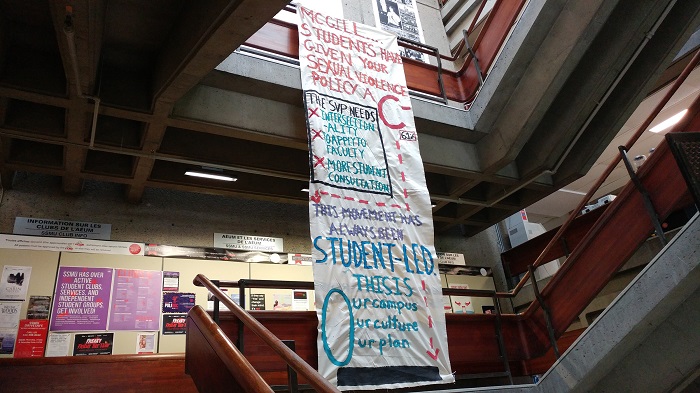Between Oct. 21 and 27, It’s On Us McGill hosted a week of action and held events across campus to encourage students to support survivors of sexual harassment. The events included Teal Tuesday, where students wore teal to show support for survivors, a session dedicated to writing love and support letters that will be donated to a Montreal-based support organizations, a self-care crawl where students engaged in therapeutic activities such as colouring and board games, and a dog therapy session.
It’s On Us is a non-profit organization founded by the White House Council for Women and Girls under the Obama administration in 2014. A chapter of It’s On Us opened at McGill in 2016, and McGill was the first university campus outside the US to register as part of the organization. It aims to eradicate sexual violence on university campuses and raise awareness of problems pertaining to sexual harassment. Since its inception, It’s On Us has hosted educational events on over 150 college campuses across the globe. Today, however, the organization is considered a non-governmental organization and therefore no longer maintains any affiliations.
Melissa Savoie, U3 Arts and co-president of It’s On Us McGill, spoke to the significance of the week of action and its contribution to raising awareness of sexual violence on campus.
“To people […] who go to our workshops, we say, ‘anything that’s said stays in this room, but anything that’s learned is taken [away] and applied in everyday situations,’” Savoie said. “To anyone who gets involved, we want them to be able to share their knowledge, because that’s how change is enacted. We want to start holding one another accountable for our actions.”
Savoie explained that the main goal of these events, and of the organization itself, is to educate and engage with survivors, giving them the ability to take back control over their experience, and to give bystanders of situations of sexual violence the confidence to intervene.
“We have a survivor focus and a preventative focus, as well,” Savoie said. “Sometimes perpetrators want to talk about their role or their intentions. [Instead], we really try to shift the focus [to] the impact [that sexual harassment] has. While we acknowledge [the perpetrators’] intentions, we focus on the impact [of sexual harassment] on the [survivor].”
This year, the organization intends to focus on consent education and helping students understand the destabilizing effects of substance use in conjunction with sexual harassment.
Liam Pantis, U2 Arts and Science and vice-president programmer of It’s On Us McGill, addressed the variety of new projects and collaborations the group plans to undertake. Recently, the group held workshops in partnership with the fraternity Phi Delta Theta.
“As an organization, we understand the importance of peer interaction,” Pantis said. “Oftentimes, if you hear one of your buddies talking about […] bystander intervention, or survivor support, you’re more likely to [feel] compassionate [about] those things, as opposed to when somebody is lecturing to you. So the goal with [these] workshops is to target the groups on campus that we think are […] socially important so they can spread the word within themselves.”
Rebecca Sideras, U2 Arts, who attended the self-care crawl, felt that It’s On Us creates the space for people to speak openly about their experiences of sexual harassment and thus contributes to the destigmatization of harmful notions associated with survivors.
“I feel that making [people aware of the problems of sexual assault] might eliminate things like this,” Sideras said. “If [change] doesn’t happen from the bottom-up, it’s not going to be constructively implemented in a top-down [manner].”







